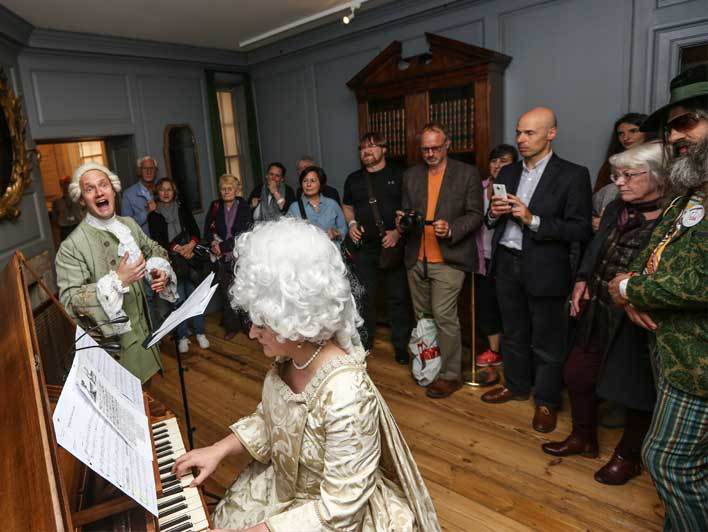MUZIO SCEVOLA (HWV 13)
Libretto: Paolo Antonio Rolli
First performance: 15th April 1721, King's Theatre, London
Cast
- Francesco Bernardi, called 'Senesino' (Alto castrato)
- Margherita Durastanti (Soprano)
- Matteo Berselli (Soprano castrato)
- Maddalena Salvai (Soprano)
- Caterina Galerati (Soprano)
- Anastasia Robinson (Contralto)
- Giuseppe Maria Boschi (Bass)
Synopsis

Act I
Porsenna, King of Tuscany is allied with Tarquinio, recently ousted from the Roman throne. Blind to this villain’s flaws, Porsenna has promised him the hand of his own daughter Irene. She is secretly pledged to a young Roman officer Orazio. Irene encourages Orazio to resist Tarquinio’s efforts to regain his throne. The conflict climaxes in a ‘valorous action’ whereby Orazio stands off the enemy at the Sublican bridge, sets it afire and jumps into the Tiber River.
Act II
Muzio is another young Roman warrior, betrothed to the fiery-but-comely maiden Clelia. Determined to match Orazio’s bravery, he sets off to the enemy camp to assassinate Porsenna. Failing, Muzio defies the king by thrusting his own hand into the sacred flame. This ‘valorous action’ prompts the kindly – but simple – monarch to forgive Muzio. Later in battle, Porsenna captures Clelia. He takes her hostage, but in doing so loses his heart.
Act III
Porsenna declares himself to Clelia, offering his own throne and an armistice with Rome. Though tempted, she declines due to a prior, secret betrothal. The naive King asks Muzio’s aid in winning Clelia. Tormented, Muzio agrees. Meanwhile, Irene and Orazio secretly meet to declare their own love
Clelia defies both Porsenna and Muzio with the final ‘valorous action’ taking yet another plunge into the Tiber. Porsenna is outraged at her escape but assuaged by Muzio’s reassurances. All meet again in Rome. Porsenna, realizing Clelia’s true love for Muzio, sacrifices his own and also gives Irene to Orazio. All manages to end happily.
(c) John Ostendorf
Context
In November 1719 the Italian composer Giovanni Bononcini, then resident in Rome, had received an invitation from the Royal Academy of Music to provide an opera for the King’s Theatre in London. The Academy’s second season opened on 19th November 1720 with his Astarto which was to be performed an astonishing 24 times. Almost immediately a rivalry between Handel and Bononcini developed – not between the two composers themselves, but rather their fans. The Duke of Marlborough and most of the aristocracy supported Bononcini, while Handel had the backing of the Prince of Wales and his associates. The satirist John Byrom summed up the rivalry in a catchy verse:
“Some say, compar’d to Buononcinny
That Mynheer Handel’s but a Ninny.
Others aver, that he to Handel
Is scarcely fit to hold a Candle:
Strange that this difference there should be
Twixt Tweedle-dum and Tweedle-dee!
Handel’s biographer John Mainwaring reports that, in order to alleviate this apparent antagonism between their two star composers, the Academy decided to have them compose an act each of a new opera. Such joint compositions were not unusual in the 18th century, and even into the 19th century, but this is the only record of such an arrangement being seen as a direct competition between the individual composers.”
The first act was set by Filippo Amadei, the principal cellist of the Royal Academy orchestra who had previously been employed in Rome by one of Handel’s Italian patrons, Cardinal Ottoboni. There are few surviving compositions by Amadei and it seems that after about 1724 he abandoned composition in favour of his skills as a performer. Bononcini set the second act, and Handel set the third. The general opinion was that Handel’s music was far superior to that of his collaborators.
The first performance of Muzio Scevola on 15th April 1721 was interrupted by the announcement of the birth of a son to the Princess of Wales. The boy was to become the Duke of Cumberland, whose military success in 1746 against the Jacobites at the Battle of Culloden was to be celebrated by Handel’s oratorio Judas Maccabaeus.
In a rare glimpse into Handel’s domestic life, his own copy of the libretto of Muzio Scevola has a scribbled laundry list on the final blank page: ’12 shirts, 3 aprons, 1 hood, 7 combing clothes, 5 pairs coats 2 have buttons and 2 strings. Mr Handl’


